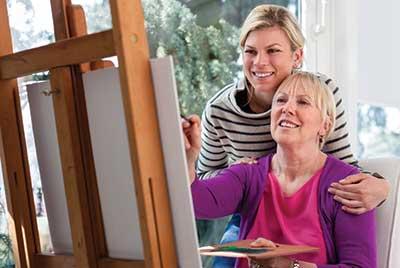Beneficial Activities for Engaging Your Loved One with Dementia
 A diagnosis of Alzheimer’s or other form of dementia for your loved one does not mean he/she can no longer enjoy the activities in life that he/she has always derived pleasure from. In fact, continuing his/her favorite activities is strongly encouraged and highly beneficial.
A diagnosis of Alzheimer’s or other form of dementia for your loved one does not mean he/she can no longer enjoy the activities in life that he/she has always derived pleasure from. In fact, continuing his/her favorite activities is strongly encouraged and highly beneficial.
Social Engagement Activities Improve Quality of Life
Experts in the field of dementia therapy say that activities that socially engage people with Alzheimer’s disease or other form of dementia can enhance his/her physical and emotional well-being and improve his/her overall quality of life. Research shows that social connectivity helps to improve cognitive ability and can also reduce behaviors such as wandering or agitation.
Activities that engage your loved one socially and mentally are viewed as “best practices” by the Alzheimer’s Association. In their publication “Campaign for Quality Residential Care,” they assert that loved ones with dementia “should have the opportunity to maintain and enhance their sense of dignity and self-esteem by engaging in meaningful social interactions throughout the day, every day.” Meaningful activities are considered highly important for individuals with dementia because they help them to maintain their functional abilities and can enhance overall well-being.
How to Choose Activities That Are Best for Your Loved One
To get started, consider the things your loved one has always enjoyed doing throughout his/her life. Some of these may need to be modified because of the progressive nature of the disease. A recent article titled “Choosing Activities” by the Alzheimer’s Association offers helpful tips for planning socially and mentally engaging activities, including:
- Identify his/her past favorites – The person who always enjoyed drinking coffee and reading the newspaper may still find these activities enjoyable, even if he/she is not able to completely understand what the newspaper says. A former office worker might enjoy activities that involve organizing, such as making a “to-do” list.
- Pay special attention to what he/she enjoys now – Take note when the person seems happy. Some people enjoy watching sports, while others enjoy helping with housework.
- Encourage his/her involvement in daily life – Any activities that help the individual feel valued – such as setting the table – can provide a sense of success and accomplishment and should be continued.
- Focus on his/her enjoyment, not achievement – Find activities that build on his/her remaining skills and talents. For example, a professional artist might become frustrated over the declining quality of work, but an amateur might enjoy a new opportunity for self-expression.
- Adjust the activities to his/her disease stages – As the disease progresses, you may want to introduce more repetitive tasks. Be prepared for your loved one to eventually take a less active role in activities.
Helpful Activities That Are Engaging and Stimulating
Planned activities can enhance your loved one’s sense of dignity and self-esteem by giving more purpose and meaning to his/her life. The Alzheimer’s Association Guide, “Activities at Home Planning the day for a person with dementia” provides useful insight and direction for caregivers to help them organize activities that will be both mentally and socially stimulating. These include:
Daily Routines
- Chores – Dusting, sweeping, doing laundry
- Mealtime – Preparing food, cooking, setting the table
- Personal care – Bathing, shaving, getting dressed
Other Activities
- Creative – Painting, playing the piano
- Intellectual – Reading a book, doing crossword puzzles, playing a board game
- Physical – Taking a walk, playing catch
- Social – Having coffee, talking, playing cards, visiting with a pet, reminiscing over old photos
- Spiritual – Praying, singing a hymn
- Spontaneous – Going out to dinner, visiting friends
- Work-related – Making notes, typing, fixing something
With a little forethought and planning, activities that promote social engagement can be highly beneficial and provide a sense of comfort, togetherness and security that both you and your loved one with dementia can enjoy.
Help Is Available for Caregivers
Today, a variety of resources is available to assist caregivers who are caring for their loved ones at home. These include Alzheimer’s Association services, support groups, self-help guides, Respite Care services, in-home support, community-based services and educational programs. Progressive, residential Memory Care providers, such as North Woods Village at Edison Lakes, offer a variety of educational programs, support and special events designed to help family caregivers.
Guiding. Caring. Inspiring.
For caregivers who recognize that the needs of their loved one are beyond what they can safely and appropriately provide in the home environment, leading, residential Memory Care Assisted Living Communities (MCALs), such as North Woods Village at Edison Lakes and its “NEW DIRECTIONS”SM program in Mishawaka, IN, provide the full continuum of services that have been shown to improve health and well-being, support brain health and delay the progression of memory loss from Alzheimer’s disease and dementia.
At North Woods Village at Edison Lakes, we believe senior adults thrive in an environment that offers an active, vibrant lifestyle with a variety of activities that engage the mind, body and spirit. Our “NEW DIRECTIONS”SM provides a safe, professional environment and proven, best-practice programs and services specifically designed to address the total physical, emotional and social needs of individuals with Alzheimer’s, dementia or other serious form of memory impairment.
For more information and helpful resources on activities for engaging your loved one, contact us today!
